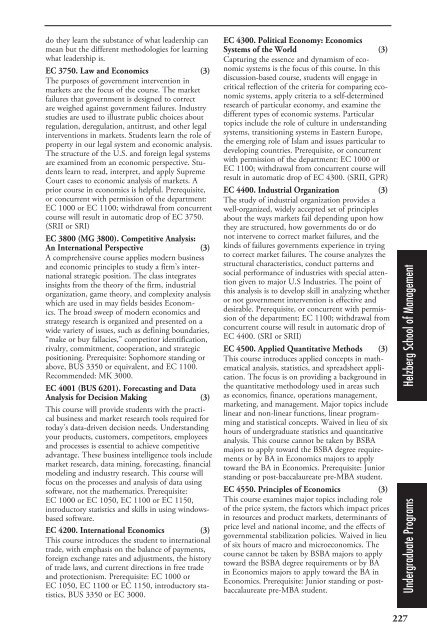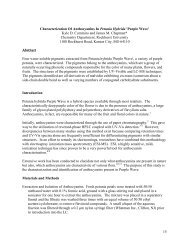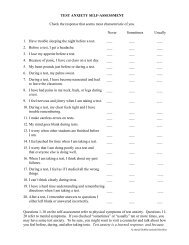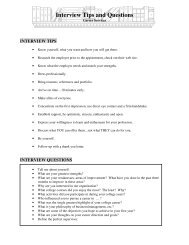RockhuRst univeRsity 2012â2014 catalog
RockhuRst univeRsity 2012â2014 catalog
RockhuRst univeRsity 2012â2014 catalog
- No tags were found...
Create successful ePaper yourself
Turn your PDF publications into a flip-book with our unique Google optimized e-Paper software.
do they learn the substance of what leadership canmean but the different methodologies for learningwhat leadership is.EC 3750. Law and Economics (3)The purposes of government intervention inmarkets are the focus of the course. The marketfailures that government is designed to correctare weighed against government failures. Industrystudies are used to illustrate public choices aboutregulation, deregulation, antitrust, and other legalinterventions in markets. Students learn the role ofproperty in our legal system and economic analysis.The structure of the U.S. and foreign legal systemsare examined from an economic perspective. Studentslearn to read, interpret, and apply SupremeCourt cases to economic analysis of markets. Aprior course in economics is helpful. Prerequisite,or concurrent with permission of the department:EC 1000 or EC 1100; withdrawal from concurrentcourse will result in automatic drop of EC 3750.(SRII or SRI)EC 3800 (MG 3800). Competitive Analysis:An International Perspective (3)A comprehensive course applies modern businessand economic principles to study a firm’s internationalstrategic position. The class integratesinsights from the theory of the firm, industrialorganization, game theory, and complexity analysiswhich are used in may fields besides Economics.The broad sweep of modern economics andstrategy research is organized and presented on awide variety of issues, such as defining boundaries,“make or buy fallacies,” competitor identification,rivalry, commitment, cooperation, and strategicpositioning. Prerequisite: Sophomore standing orabove, BUS 3350 or equivalent, and EC 1100.Recommended: MK 3000.EC 4001 (BUS 6201). Forecasting and DataAnalysis for Decision Making (3)This course will provide students with the practicalbusiness and market research tools required fortoday’s data-driven decision needs. Understandingyour products, customers, competitors, employeesand processes is essential to achieve competitiveadvantage. These business intelligence tools includemarket research, data mining, forecasting, financialmodeling and industry research. This course willfocus on the processes and analysis of data usingsoftware, not the mathematics. Prerequisite:EC 1000 or EC 1050, EC 1100 or EC 1150,introductory statistics and skills in using windowsbasedsoftware.EC 4200. International Economics (3)This course introduces the student to internationaltrade, with emphasis on the balance of payments,foreign exchange rates and adjustments, the historyof trade laws, and current directions in free tradeand protectionism. Prerequisite: EC 1000 orEC 1050, EC 1100 or EC 1150, introductory statistics,BUS 3350 or EC 3000.EC 4300. Political Economy: EconomicsSystems of the World (3)Capturing the essence and dynamism of economicsystems is the focus of this course. In thisdiscussion-based course, students will engage incritical reflection of the criteria for comparing economicsystems, apply criteria to a self-determinedresearch of particular economy, and examine thedifferent types of economic systems. Particulartopics include the role of culture in understandingsystems, transitioning systems in Eastern Europe,the emerging role of Islam and issues particular todeveloping countries. Prerequisite, or concurrentwith permission of the department: EC 1000 orEC 1100; withdrawal from concurrent course willresult in automatic drop of EC 4300. (SRII, GPR)EC 4400. Industrial Organization (3)The study of industrial organization provides awell-organized, widely accepted set of principlesabout the ways markets fail depending upon howthey are structured, how governments do or donot intervene to correct market failures, and thekinds of failures governments experience in tryingto correct market failures. The course analyzes thestructural characteristics, conduct patterns andsocial performance of industries with special attentiongiven to major U.S Industries. The point ofthis analysis is to develop skill in analyzing whetheror not government intervention is effective anddesirable. Prerequisite, or concurrent with permissionof the department: EC 1100; withdrawal fromconcurrent course will result in automatic drop ofEC 4400. (SRI or SRII)EC 4500. Applied Quantitative Methods (3)This course introduces applied concepts in mathematicalanalysis, statistics, and spreadsheet application.The focus is on providing a background inthe quantitative methodology used in areas suchas economics, finance, operations management,marketing, and management. Major topics includelinear and non-linear functions, linear programmingand statistical concepts. Waived in lieu of sixhours of undergraduate statistics and quantitativeanalysis. This course cannot be taken by BSBAmajors to apply toward the BSBA degree requirementsor by BA in Economics majors to applytoward the BA in Economics. Prerequisite: Juniorstanding or post-baccalaureate pre-MBA student.EC 4550. Principles of Economics (3)This course examines major topics including roleof the price system, the factors which impact pricesin resources and product markets, determinants ofprice level and national income, and the effects ofgovernmental stabilization policies. Waived in lieuof six hours of macro and microeconomics. Thecourse cannot be taken by BSBA majors to applytoward the BSBA degree requirements or by BAin Economics majors to apply toward the BA inEconomics. Prerequisite: Junior standing or postbaccalaureatepre-MBA student.Helzberg School of ManagementUndergraduate Programs227
















